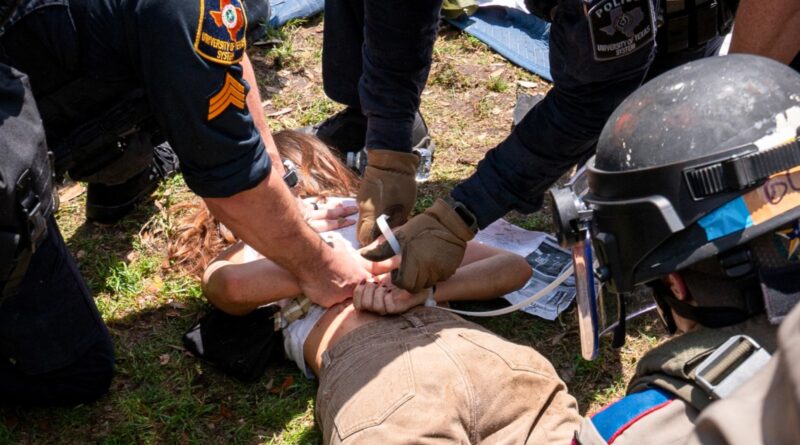More than 2,000 people arrested nationwide in pro-Palestinian campus protests
The clashes between police officers and pro-Palestinian protesters on college campuses have seized national attention, putting a spotlight on modern-day campus activism, law enforcement tactics and the contentious debate over Israel’s war in Gaza. In the last three weeks, more than 2,000 people have been arrested across the U.S., according to a tally compiled by NBC News.
The arrests of protesters at Columbia University and UCLA have drawn particular scrutiny in recent days, but political demonstrations and heated confrontations have also roiled dozens of other campuses across the U.S., from state schools in the South and the Midwest to Ivy League institutions in the Northeast.
The sheer number of arrests helps illustrate how quickly pro-Palestinian encampments and the police responses turned into chaotic flashpoints, dividing campuses and their surrounding communities. Meanwhile, Jewish and Muslim students alike have raised concerns about a sharp uptick in antisemitism and Islamophobia since the start of the Israel-Hamas war on Oct. 7.
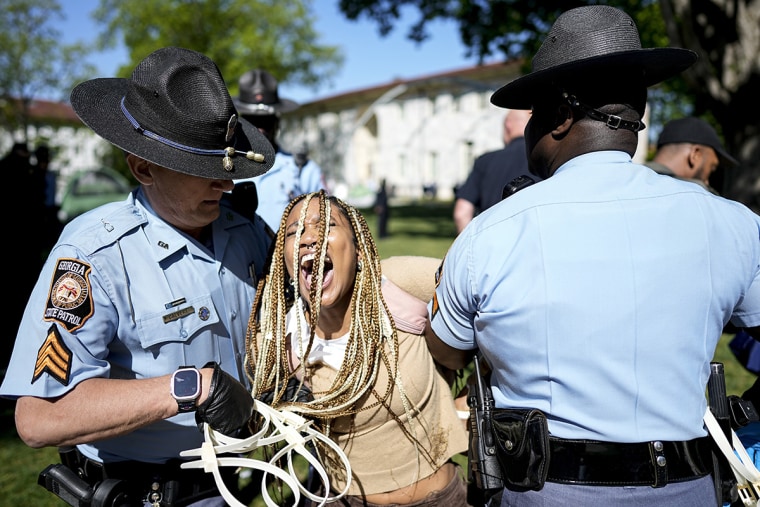
At least 2,100 people were arrested nationwide from April 17 to Thursday evening, according to the tally. There were at least 100 arrests apiece at eight campuses, including Emerson College and Northeastern University in Boston, Washington University in St. Louis and the University of Texas at Austin.NBC News compiled tallies of the arrests based on statements from the universities or local law enforcement agencies.
In the last month, law enforcement officers made arrests on campuses including Arizona State University in Phoenix, where 72 people were arrested; California State Polytechnic University, Humboldt, in Arcata, where 32 were arrested; and the University of Utah in Salt Lake City, where 17 people were arrested.The wave of arrests has provoked intense conversations about how university administrators, police departments, big-city mayors and community leaders should enforce laws without infringing on speech.
The leaders of many universities have defended their decisions to call in law enforcement, including when protesters who were suspected of trespassing or disorderly conduct — and, in Columbia’s case, overtaking a building on campus — did not follow orders to disperse. In some instances the intensity of the police response has drawn harsh criticism from protesters, activists and their allies.
Arwyn Heilrayne, 19, a freshman at the University of Texas at Austin who was arrested April 24 during a pro-Palestinian campus protest, described how “hell broke loose” after officers told the crowd to disperse and purportedly arrested a protest organizer.
“I was standing very much off to the side, just recording, and a couple officers came and just took me to the ground and arrested me,” Heilrayne said. In the frantic aftermath of the arrest, she struggled to make sense of what was happening around her.
“I was definitely upset. I was also very confused, honestly, because I’d been doing everything that I was asked to do,” she said. “I wasn’t being confrontational with them or anything. But I was definitely scared.” (She was charged with trespassing, but the charge has since been dropped, she said.)
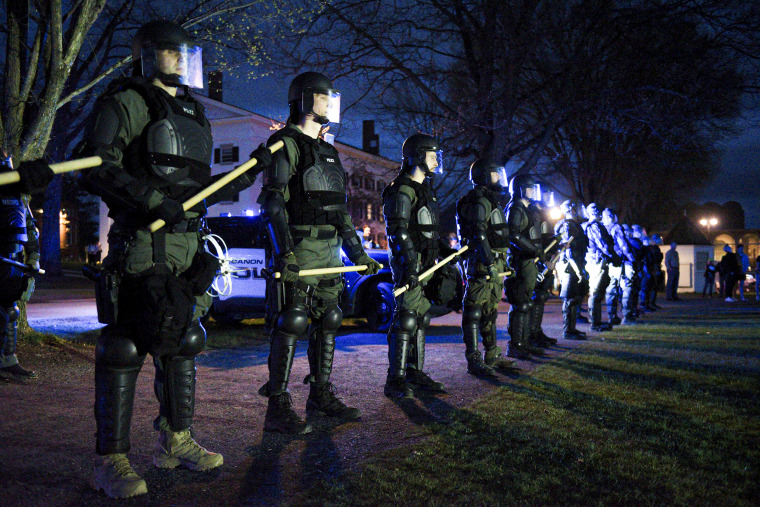
Alivia, 21, a senior at the University of Wisconsin-Madison, spoke on the condition that NBC News withhold her last name because she was concerned for her safety. She described the moment she was arrested on campus Wednesday as similarly tumultuous. “They started grabbing people. They grabbed me and dragged me on the concrete and threw me facedown on the concrete,” she said, adding that police beat her head and her side to get her arms behind her back.Police departments in Austin and Madison did not immediately respond to requests for comment on both students’ claims.
In some cases, the people arrested at campuses across the U.S. were current or former students; in other cases, they were not affiliated with the campuses in question.
New York police and Mayor Eric Adams said Thursday that roughly 29% of the 112 people arrested at Columbia on Tuesday were “unaffiliated parties.” They added that 60% of the 170 people arrested at City College of New York that day were unaffiliated, too.
Gingger Shankar, a Los Angeles resident who is not a UCLA student but joined the campus protests, heard police helicopters begin circling above UCLA’s encampment around 9 p.m. Wednesday. Four hours later, she said, chaos erupted as police shot tear gas and rubber bullets indiscriminately into the encampment.
“They were so crazy,” Shankar said. “They just kept shooting.”
At around 5:30 a.m., she joined dozens of protesters who had locked arms to prevent police from entering the encampment. She said she heard an officer say: “Whose arm are we going to dislocate?” Shankar was arrested and charged with unlawful assembly. She has a court date in July.
In some instances, faculty members were caught up in the arrests. Noelle McAfee, the chair of the philosophy department at Emory University in Atlanta, confirmed in an interview that she was arrested and charged with disorderly conduct last Thursday after she observed (but did not participate in) the pro-Palestinian protest on campus.
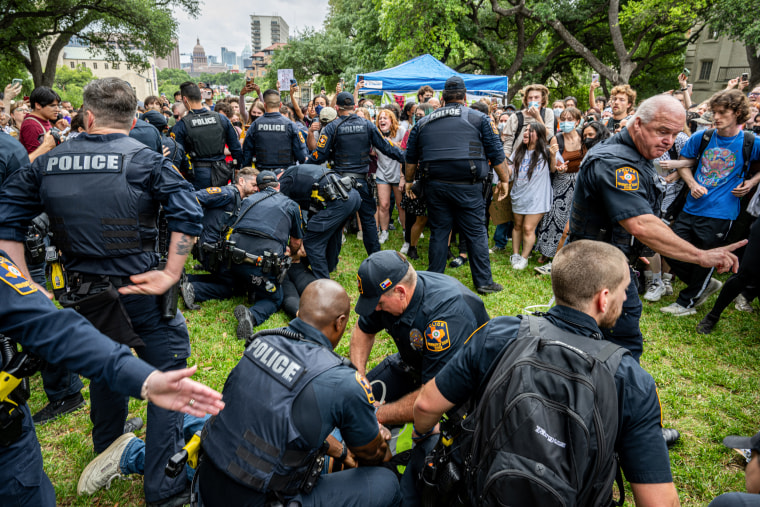
McAfee, who is also the president-elect of the Emory University Senate, left her office and went to the protest because she was growing increasingly concerned that university leaders would call in outside law enforcement agencies to break up the encampment. She said she saw an officer “whaling on” a protester. She told the officer to stop, he told her to back away, and she said no. That’s when she was handcuffed by an officer wearing a balaclava and taken away. The arrest was recorded in a video that later circulated widely on social media platforms. McAfee said she was booked at the county jail but released quickly. She called an Uber and returned to her office on campus for a meeting.
“It was traumatic, and for four or five nights I didn’t sleep for more than an hour. The incident of being taken to jail, frankly, does not fluster me at all. What has been so awful is that my own university administration did this to our students,” McAfee said, referring to Emory’s decision to call in local police.
In a statement, Emory’s vice president for public safety said that the school originally believed that the people who built the encampment were not members of the community but that school officials later learned that was “not fully accurate” and a “mischaracterization.”
“I take Thursday’s events very seriously and we are launching a thorough review of them so that we can develop recommendations to improve how we keep our community safe,” said the vice president, Cheryl Elliott. “This review will include how Emory engages external law enforcement agencies.”
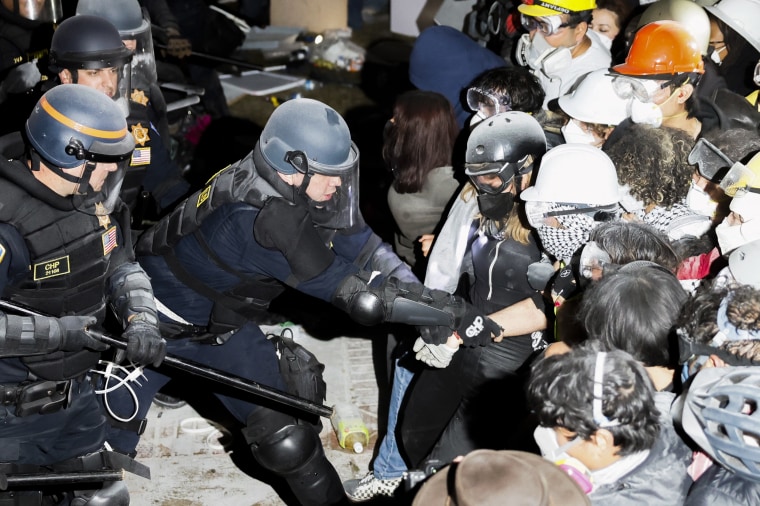
In remarks at the White House on Thursday, President Joe Biden said the nationwide protests “put to the test two fundamental American principles. The first is the right to free speech and for people to peacefully assemble and make their voices heard. The second is the rule of law. Both must be upheld.”Biden’s attempts to quell the unrest may go only so far. Heilrayne, the Texas college student who was arrested last week, said she intends to keep rallying for Palestinian human rights.
“It’s a little bit intense going back to campus and walking past all the law enforcement that is still on campus. But it is 100% worth it. Yes,” she said. “As long as the Palestinian students at UT are asking me to show up, I will continue to show up.”
Daniel Arkin and Daniella Silva reported from New York, Alicia Victoria Lozano from Los Angeles and Maura Barrett from Madison, Wisconsin.

Daniel Arkin
Daniel Arkin is a national reporter at NBC News.

Daniella Silva
Daniella Silva is a national reporter for NBC News, focusing on immigration and education.

Alicia Victoria Lozano
Alicia Victoria Lozano is a California-based reporter for NBC News focusing on climate change, wildfires and the changing politics of drug laws.
Maura Barrett
Maura Barrett is a correspondent for NBC News.
Joe Kottke
and
Selina Guevara
contributed
.

